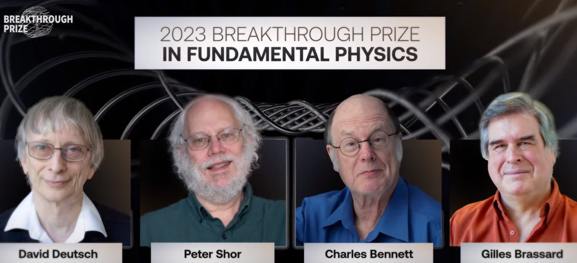| $3 Million Breakthrough Prize For Quantum Computing |
| Written by Sue Gee | |||
| Sunday, 25 September 2022 | |||
|
The 2023 Breakthrough Prize in Fundamental Physics is shared by four individuals who have made a range of contributions regarded as “foundational work in the field of quantum information.” The Breakthrough Prize is the world's largest science prize with each prize worth $3 million, to be shared between its recipients. First awarded in 2012, its founders are Sergey Brin, Priscilla Chan, Julia and Yuri Milner, and Mark Zuckerberg. Prizes in Mathematics, Life Science and Fundamental Physics are awarded annually to scientists and mathematicians chosen by committees of previous winners and are widely regarded as the "Oscars" of science as prior to the pandemic, they were presented at a glitzy, televised, ceremony in Silicon Valley. There are four recipients of the 2023 Breakthrough Prize in Fundamental Physics all of whom made their contribution to the current state of quantum computing some time ago. David Deutsch became known as the “father of quantum computing” by proposing a theoretical machine to test the existence of parallel universes in his paper "Quantum Theory as a Universal Physical Theory", published in 1985. Subsequently he elaborated on this start by defining the quantum version of a Turing machine – a universal quantum computer - and proved that it could simulate to arbitrary accuracy any physical system that obeys the laws of quantum mechanics. He showed that such a computer is equivalent to a network of surprisingly few quantum gates – logic gates that leverage entanglement and the quantum superposition of many states at once and provided descriptions of quantum bits, or qubits. And, of course it was Deutsch who wrote the first quantum algorithm that would surpass the best equivalent classical algorithm. The other well-know algorithm for Quantum computing is Peter Shor’s algorithm to factor large numbers exponentially faster than any classical algorithm and was the first algorithm to demonstrate potential usefulness of quantum computing in the future. Shor also also designed techniques for error-correction in quantum computers which is a much harder to do than in classical computers, where simple redundancy will suffice. According to the Breakthrough Prize announcement: These ideas not only paved the way for today’s fast-developing quantum computers; they are now also at the frontiers of fundamental physics, especially in the study of metrology – the science of measurement – and of quantum gravity. The award cites the field of quantum information and it was the other two recipients of the prize, Charles H. Bennett and Gilles Brassard, who with their BB84 protocol initiated quantum cryptography by devising a practical way to send secret messages between users who share no secret information initially. Unlike methods commonly used in e-commerce, it cannot be broken even by an eavesdropper with unlimited computing power. The announcement comments: Their 1993 discovery, with collaborators, of quantum teleportation, showed that entanglement is a useful quantifiable resource despite having no communication capacity of its own, thereby helping launch the new science of quantum information processing. In 2020 Shor, Brassard and Bennett shared the BBVA Frontiers Of Knowledge Award for their outstanding contributions to the field of quantum technologies and you can read more about how the two strands of their work could propel quantum computing forward in our report about it here.
More InformationRelated ArticlesPeter Shor Gains Frontiers Of Knowledge Award A Quantum Computer Finds Factors To be informed about new articles on I Programmer, sign up for our weekly newsletter, subscribe to the RSS feed and follow us on Twitter, Facebook or Linkedin.
Comments
or email your comment to: comments@i-programmer.info |
|||
| Last Updated ( Sunday, 25 September 2022 ) |




